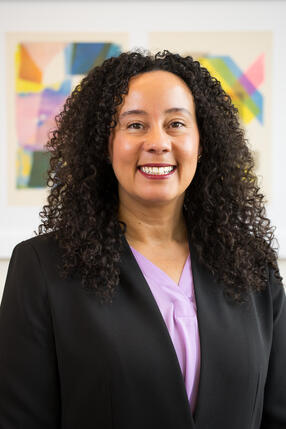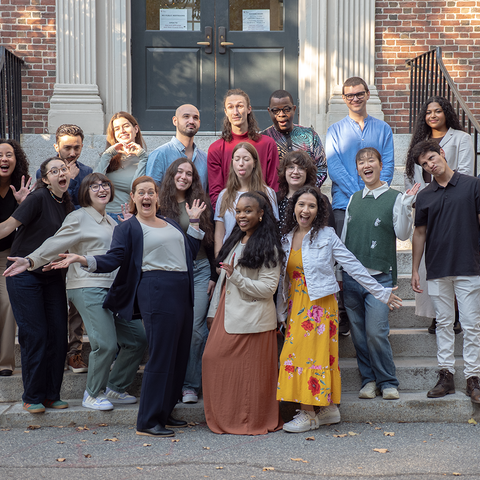The Connector
New dean of students brings with her a passion for engagement and flourishing
On March 24, Dr. Lakshmi Clark joined the Harvard Kenneth C. Griffin Graduate School of Arts and Sciences (Harvard Griffin GSAS) as dean of students. Formerly the senior director of student affairs at Harvard Law School (HLS), Clark brings decades of experience in higher education to her new role, including over a decade serving students with disabilities at New York University (NYU). In the following interview with Harvard Griffin GSAS’s Office of Communications, she talks about her path to a career in student affairs, the challenges facing graduate students, and her passion for collaboration, engagement, and student flourishing.
Can you talk about your journey in higher education? What drew you to student affairs?

I have always worked with adult learners in some capacity. During and immediately following college, I was involved in adult literacy programs. I worked with adults in settlement houses and other community agencies in New York City, which sparked my interest in supporting adult learners who may have faced struggles or barriers in achieving their goals and dreams.
As I considered my next career move, I began to explore opportunities in higher education. I applied for a position at New York University in their Center for Students with Disabilities, which was my first substantial role related to student affairs. I loved working there and spent around 10 years at NYU. My primary focus was on students with disabilities across the university, including the graduate schools. That’s where I developed a strong affinity for student affairs, particularly with a focus on equity and creating structures and resources that support the whole student.
After more than 20 years in New York, where I had my first child, I began to feel as though it might be time for a change of pace from life in Manhattan. I started exploring other institutions and applied for a job at Harvard. I worked in the Office of the Dean of Students at the Law School as an assistant director of student services. I was warmly welcomed and fell in love with Harvard as soon as I set foot on campus.
My role at HLS involved overseeing accessibility services and supporting our dean of students on various matters, including Title IX, residential life issues, administrative board matters, and international student affairs. I worked closely with student organizations in various capacities. Over the years, I have been promoted within the office, first to director and most recently to senior director of student affairs. I loved my work at HLS. I enjoy collaborating across departments and Schools within the University to support students in reaching their goals and dreams.
What does “student life” mean to you? How do you define it?
For me, it’s about connecting the experiences that students have outside the classroom to those they have inside, with a particular interest in the impact of student affairs work. That includes involvement in student organizations, residential life, academic support services, and support for significant issues like Title IX, family emergencies, and personal crises. Universities, through student life professionals, have a responsibility to foster engagement by curating opportunities for positive and meaningful interactions with faculty, staff, and fellow students.
In my doctoral dissertation, I explored graduate student engagement and examined how institutional supports can aid students holistically. We know that more engaged students have better academic outcomes and higher graduation rates, and also feel a deeper sense of connectedness and satisfaction with their institutions. This, in turn, strengthens our relationship with alumni, faculty, and the broader community.
What brought you from HLS to Harvard Griffin GSAS?
My passion lies in working with graduate students, which I’ve done at both NYU and Harvard Law School. This new role allows me to broaden my impact on the graduate student experience. Harvard Griffin GSAS offers dozens of degree programs across multiple Schools, allowing the student affairs staff to influence the lives of students across the University. I’ve also had the pleasure of working over the years with many colleagues at Harvard Griffin GSAS, and have great respect for the work they do. I’m very excited to collaborate with them.
How do you think your experience at Harvard Law School will benefit you in your new role here?
At HLS, my work required extensive collaboration with individuals outside of our immediate department. That helped me develop solid relationships and connections with colleagues across the University. I consider myself a relational and collaborative person by nature. I genuinely enjoy learning about others and forming connections. My work at HLS further developed those skills by requiring me to think strategically about decision-making processes or discussions. It also taught me the importance of process, policy, and careful deliberation when implementing changes. For the best possible outcome, it’s critical to consider different perspectives and incorporate them into decision-making processes—whether it relates to a student matter or a policy issue.
What areas or challenges do you think you’ll need to learn more about in your new role?
There will certainly be a learning curve as I get to know the individual programs within Harvard Griffin GSAS, each of which has its own culture, nuances, and people. I have been encouraged by the outreach from new colleagues offering to meet with me and help with my transition. I’m grateful for their guidance and won’t hesitate to ask for information when I need it. Having gone through a rigorous doctoral program myself, I understand what it's like to balance academic demands with family responsibilities, face challenges along the way, and ultimately reach one's goals. I feel a strong connection to students' experiences, which, I hope, will aid me in the transition.
As you’ve mentioned, one of the exciting aspects of your role is the chance to have an impact on students across the University. At the same time, the fact that students are dispersed across campus also makes creating a coherent, supportive community a real challenge. How do you hope to address it?
Orientation is a particular period I cherish. It’s an opportunity to create an environment of connectedness and belonging right from the start. Nevertheless, the enthusiasm from orientation often wanes, especially when PhD students reach the dissertation phase, which can be all-consuming. Strategically identifying touchpoints throughout students' academic journeys can help maintain engagement.
Along those lines, I am continually impressed by the proactive community-building efforts at the Student Center at Lehman Hall, led by Jackie Yun and her team. While students are often busy, promoting involvement in student organizations and other engagement opportunities can enhance their sense of belonging. I have a keen academic and personal interest in academic advising, which can also profoundly influence student engagement and connectivity, so I’m excited to carry forward Dean Dench’s emphasis on this critical aspect of the graduate experience.
Finally, to foster a supportive community, engaging with faculty and forming connections with academic departments is essential. Each program within GSAS is unique, so there isn't a one-size-fits-all solution. A culture rooted in collaboration can positively impact students' experiences.
From your perspective, what are some of the key challenges currently facing graduate students at Harvard? Are any particular to Harvard Griffin GSAS, and how do you hope to address them?
Harvard is one of the most amazing higher education institutions in the world. It’s vibrant, exciting, innovative, and historic. With that, and as a student, those traits can bring feelings of excitement but also wonder or uncertainty. And for graduate students who may have other responsibilities, such as caring for family or children, the rigors of academics and personal life can be challenging. It is even more important for student affairs professionals to think strategically and holistically about how to support students. My academic and professional work has focused on the role of student affairs in supporting students, and also the importance of opportunities for engagement and connectedness across student and academic affairs. And with recent changes in the higher education landscape, that connectedness and attention to student support continue to be especially important.
How do you envision improving or enhancing student engagement and support within GSAS? Are there specific initiatives you hope to implement?
Orientation is a keystone for student engagement. Understanding how academic advising interacts with student life at Harvard Griffin GSAS is also a priority. I’m eager to learn more about current practices and identify opportunities for innovation and improvement. Also, considering the student's journey from G1 to G5, 6, or 7, we should be proactive in maintaining engagement throughout their academic careers. Strategically engaging students at various points during their program could make substantial improvements in their overall experience.
How do you plan to foster collaboration with faculty, staff, and students to create an inclusive and supportive environment for all members of the School’s community?
I am committed to providing opportunities for growth and new experiences. Serving as the co-chair of the University Student Affairs Professional Development Committee has allowed me to support staff across Harvard. We developed professional opportunities based on feedback, including sessions on University policies, managing complex concerns, AI, and more.
More broadly, I prioritize relationship-building and inclusivity, and I strive to model collegiality, approachability, and friendliness. Recognizing Harvard's decentralized nature, fostering collaboration requires intentionality. Initiatives like monthly gatherings and reaching out to colleagues and students can foster connections and overcome the challenges of decentralization. Being in a rigorous program is rewarding, but it does come with challenges. Graduate students often face major life stressors over the course of their degree, including family circumstances and professional challenges, and it’s important to me that they know the student affairs staff can relate to them and are here to help through the ups and downs.
Finally, what aspects of the dean of students position are you most looking forward to engaging with in the months ahead, and why?
I’m excited to delve into policy-related work in student and academic affairs, ensuring that our initiatives have a positive impact on the student experience. Also, I genuinely enjoy working with the staff of Harvard Griffin GSAS. They are talented and passionate, and I look forward to learning from them. Exploring ways to support them in their roles, enhancing organizational structures, and promoting excitement and engagement will be a priority. Ultimately, the goal is to ensure that students receive exceptional support not only for their academic work but also for life outside of the classroom, library, and lab.
Get the Latest Updates
Join Our Newsletter
Subscribe to Colloquy Podcast
Simplecast





